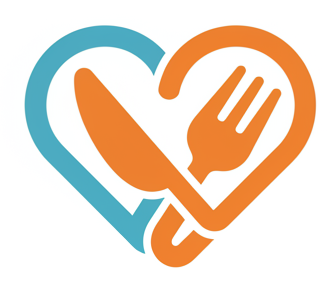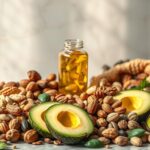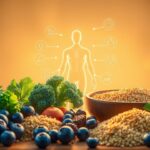It’s important to know how processed foods affect your health. Making smart food choices can help you stay healthy. Learning about the risks of processed foods is key to avoiding chronic diseases.
Processed foods can harm your health in many ways. They can lower your energy and increase your risk of serious diseases. Knowing this can help you choose better foods for a healthier life.

Understanding processed foods is the first step to a healthier life. By avoiding these foods, you can lower your risk of chronic diseases. It’s crucial to know the risks of processed foods for your health.
Introduction to Processed Foods
Processed foods have a big impact on your health. Knowing the different types and their effects is important. This knowledge helps you make better food choices.
Key Takeaways
- Understanding the impact of processed foods on your health is crucial for making informed decisions about your diet and lifestyle.
- The health effects of processed foods can be significant, affecting everything from your energy levels to your risk of chronic diseases.
- By learning about the health effects of processed foods, you can make healthier choices and improve your overall health.
- The impact of processed foods on your health can be far-reaching, and it’s essential to explore the risks associated with consuming these foods.
- By making informed choices, you can reduce your risk of chronic diseases and improve your overall well-being.
- The health effects of processed foods are a significant concern, and it’s vital to understand the impact of processed foods on your health.
Understanding Processed Foods: What They Really Are
Many of us eat processed foods every day. But have you ever thought about what they really are? Processed foods are everywhere in our lives, making it easy to grab something quick. But what are they, and how are they made?
Processed foods include things like frozen meals, canned goods, and snacks. They go through steps like freezing, canning, and drying to last longer and taste better. Understanding the different categories of food processing helps us choose better.
Different Categories of Food Processing
- Primary processing: involves cleaning, sorting, and packaging of raw ingredients
- Secondary processing: involves transforming raw ingredients into a final product, such as baking or cooking
- Tertiary processing: involves adding preservatives, flavorings, or other additives to extend shelf life or enhance flavor
Common Types of Processed Foods
Frozen pizzas, canned soups, and snacks like chips are common processed foods. They often have too much salt, sugar, and unhealthy fats. Eating too much of these can harm our health.
By being mindful of our processed food consumption, we can make healthier choices and reduce our risk of chronic diseases.
| Type of Processed Food | Processing Method | Effects on Health |
|---|---|---|
| Frozen meals | Freezing, packaging | High in sodium, preservatives |
| Canned goods | Canning, heat processing | High in sodium, sugar |
| Snack foods | Dehydrating, frying | High in unhealthy fats, sugar |
The Rise of Processed Food Consumption in Modern Society
Processed food has become a big part of our lives. Many people choose these foods because they are easy and cheap. They are great for those who don’t have much time or money for cooking.
What makes processed foods so popular? They are easy to store and cook. They also don’t cost much, which is good for people with tight budgets.
Some reasons why we eat more processed food include:
- Busy lives mean we don’t have time to cook
- We want foods that are quick and easy to make
- Food companies market their products a lot, especially to kids and young adults
But eating too much processed food can be bad. It can lead to obesity, diabetes, and heart disease. As we learn more about these dangers, we want healthier food choices. Understanding why we eat processed foods helps us make better choices for our health.
As we look for easy and affordable food, we must think about the risks. Choosing whole, nutritious foods can help us avoid chronic diseases. This way, we can stay healthy and feel good.
Nutritional Changes During Food Processing
When foods are processed, they go through big changes that affect their health. It’s key to know these changes to choose better for our health. Processed foods can harm our health in many ways.
Processed foods often lose important nutrients like vitamins and minerals. This happens because of high heat, water, or oxygen. For instance, vitamins C and B are usually lost, but vitamins A and D might stay.
Loss of Essential Nutrients
When foods lose nutrients, it can harm our health. A diet without these nutrients can cause tiredness, weakness, and a weak immune system. It’s best to pick whole, nutrient-rich foods and know the risks of processed foods.
Addition of Artificial Ingredients
Processed foods also get artificial stuff like preservatives and flavor enhancers. These can increase the risk of heart disease, diabetes, and some cancers. Being aware of these risks helps us make better food choices.
| Nutrient | Effect of Processing |
|---|---|
| Vitamin C | Often lost during processing |
| Vitamin B | May be lost during processing |
| Vitamin A | May be retained during processing |
The Impact of Processed Foods on Your Health: Scientific Evidence
Research shows that the impact of processed foods on your health is big. Eating too much of these foods can lead to serious health issues. These include obesity, diabetes, and heart disease. Processed food health risks are high because they often have lots of added sugars, sodium, and unhealthy fats.
A study by the American Heart Association found a big link. Eating lots of processed foods can raise heart disease risk by up to 30%. Another study in the Journal of Nutrition showed a link to colorectal cancer from eating too much processed meat. These studies show why we need to know about the impact of processed foods on your health and cut down on them.
- Increased risk of obesity and weight gain
- Higher risk of chronic diseases, such as diabetes and heart disease
- Increased risk of certain types of cancer
We must know these risks and make smart food choices. By picking whole, unprocessed foods and eating less processed ones, we can lower disease risks. This helps us stay healthy.
By making a few simple changes to our diet, we can significantly reduce our risk of chronic diseases and improve our overall health.
Hidden Dangers in Common Processed Foods
Many of us eat processed foods every day. But, they can harm our health. It’s important to know the risks to make better choices.
Artificial Additives and Preservatives
Processed foods often have artificial additives and preservatives. These can lead to increased risk of cancer and neurological problems. Watch out for:
- Monosodium glutamate (MSG)
- Aspartame
- Sodium nitrate
High Sodium and Sugar Content
Processed foods are often high in sodium and sugar. This can cause high blood pressure, heart disease, and obesity. Always check the labels for lower amounts.
| Food Product | Sodium Content | Sugar Content |
|---|---|---|
| Processed soup | 900mg per serving | 10g per serving |
| Canned vegetables | 500mg per serving | 5g per serving |
Knowing the dangers in processed foods helps us stay healthy. Choose whole foods and read labels to avoid risks.
Long-term Health Implications of Regular Processed Food Consumption
Eating processed foods regularly can harm your health. A diet full of processed foods raises the risk of chronic diseases. These include heart disease, diabetes, and some cancers.
Some key health issues from eating too much processed food are:
- Weight gain and obesity
- Increased risk of heart disease and stroke
- Higher risk of developing type 2 diabetes
- Certain types of cancer, such as colorectal and breast cancer
It’s important to know how processed foods affect our health. We should choose whole, nutrient-rich foods over processed ones. This helps lower the risk of chronic diseases and keeps us healthy.

Understanding the health effects of processed foods helps us control our health. We can make better food choices and live healthier lives. This includes reading labels, picking whole foods, and cooking with fresh ingredients.
By making informed choices about our diet and lifestyle, we can reduce our risk of chronic diseases and maintain optimal health.
| Food Type | Health Effects |
|---|---|
| Processed meats | Increased risk of heart disease and certain types of cancer |
| Refined sugars | Contribution to weight gain and increased risk of type 2 diabetes |
| Fried foods | Increased risk of heart disease and certain types of cancer |
The Connection Between Processed Foods and Chronic Diseases
Eating too much processed food can lead to chronic diseases. This is a big problem for our health and the health of others. It affects us all in many ways.
Studies show that eating a lot of processed foods can cause health issues. These include obesity and problems with weight. This is because these foods often have unhealthy ingredients like added sugars, salt, and bad fats.
Obesity and Weight Management
Eating mostly processed foods can make it hard to stay at a healthy weight. This increases the chance of getting obese and other health problems. To avoid these risks, we should eat more whole, nutritious foods and eat less processed and packaged foods.
Cardiovascular Health Risks
Processed foods can also harm our heart health. Eating a lot of processed meats, sugary drinks, and refined carbs can raise the risk of heart disease. Knowing these risks helps us eat less processed food and stay healthy.
Diabetes and Blood Sugar Control
Also, eating a lot of processed foods can increase the risk of type 2 diabetes. This shows we need to choose our food carefully to control blood sugar and avoid the negative effects of processed foods.
Making Healthier Food Choices: Alternatives to Processed Foods
It’s crucial to find better options than processed foods for our health. A whole food diet is a great choice. It includes foods like fruits, veggies, whole grains, lean proteins, and healthy fats.
Choosing healthier foods can help avoid the bad effects of processed foods. Here are some tips for a whole food diet:
- Read food labels to spot added preservatives, sugars, and artificial stuff
- Shop the grocery store’s edges for fresh stuff like produce, meats, and dairy
- Plan your meals and prep to have healthy foods ready
Being smart about food shopping can also help. Pick items with fewer ingredients and less processing. This cuts down on harmful additives and preservatives.

Switching to a whole food diet means putting health first. It helps cut down on processed foods and improves our food relationship.
| Food Type | Processing Level | Health Benefits |
|---|---|---|
| Whole Foods | Minimal | High in nutrients, fiber, and antioxidants |
| Minimally Processed Foods | Low | Preserved nutrients, some added ingredients |
| Highly Processed Foods | High | Low in nutrients, high in added preservatives and sugars |
Reading Food Labels: What to Watch For
Being aware of what you eat is key when it comes to processed food consumption. Reading food labels helps you make better choices. This way, you can avoid processed food health risks and eat healthier.
When you read food labels, look for hidden ingredients and potential health risks. Check the ingredient list and nutrition facts. Here are some things to watch out for:
- Sodium and sugar content
- Artificial additives and preservatives
- Trans fats and chemical modifications
By paying attention to these, you can make better food choices. This helps prevent chronic diseases. A healthy diet is about balance and being aware of what you eat.
Processed food consumption can harm your health over time. Knowing the processed food health risks helps you change your diet. This reduces your chance of getting chronic diseases.
Follow these tips to make healthier choices. Be mindful of what you eat. This way, you can avoid processed food health risks. Remember, it’s all about balance and being aware. Control your diet and control your health.
| Ingredient | Potential Health Risk |
|---|---|
| Artificial additives | Increased risk of cancer and other diseases |
| Trans fats | Increased risk of heart disease |
| High sodium content | Increased risk of high blood pressure |
Conclusion: Taking Control of Your Health Through Better Food Choices
Processed foods can have a big impact on our health. They often lack essential nutrients and contain harmful additives. But, we can take back control by choosing better foods.
Focus on eating more whole foods like fruits, veggies, and whole grains. These foods give us the vitamins and minerals our bodies need. They also provide fiber for good digestion.
Reading food labels is also important. It helps us avoid too much sodium, sugar, and artificial stuff. This keeps our diet balanced and healthy.
Starting small can make a big difference. By slowly adding healthier foods to our diet, we can feel better. We’ll enjoy the benefits of a diet that’s good for our health.
Disclaimer: This article is for informational purposes only and does not constitute medical advice. Always consult a healthcare professional before starting a new exercise or wellness routine.
FAQ
What are processed foods, and how do they differ from whole, unprocessed foods?
Processed foods are foods that have been changed from their natural state. This can include frozen meals, canned goods, and snack foods. On the other hand, whole, unprocessed foods are foods that are not changed much. Examples include fresh fruits, vegetables, and whole grains.
What are the common types of processed foods, and how do they impact our health?
Common processed foods include frozen dinners, canned soups, and sugary cereals. These foods often have a lot of salt, sugar, and unhealthy fats. Eating too much of these can lead to health problems like obesity and heart disease.
How has the rise of processed food consumption affected modern society?
The rise of processed foods is due to convenience, affordability, and marketing. While they may seem appealing, they can harm our health in the long run. They are linked to chronic diseases.
What are some of the nutritional changes that occur during food processing?
Food processing can lead to the loss of essential nutrients. Artificial ingredients like preservatives and colors are often added. This can lower the food’s nutritional value and lead to health problems.
What are some of the hidden dangers in common processed foods?
Processed foods often contain artificial additives and preservatives. They also have high sodium and sugar content. Ingredients like trans fats can lead to health issues like obesity and heart disease.
How can I make healthier food choices and reduce my consumption of processed foods?
To eat healthier, choose whole foods like fruits, vegetables, and whole grains. Read food labels and avoid products with many unknown ingredients. Plan your meals to include more whole foods.
What should I look for when reading food labels to identify potential health risks?
When reading labels, watch for high sugar, sodium, and unhealthy fats. Avoid foods with artificial ingredients and preservatives. Opt for foods that are whole and rich in nutrients.






